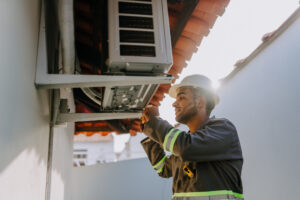Common Signs of Persistent HVAC Problems
If you find yourself constantly scheduling HVAC repairs, it may be time to consider whether your system is worth keeping. Persistent issues typically fall into two categories: recurring single-component failures or a series of unrelated problems.
Repeated Issues with a Single Component
One common scenario is a specific part, such as the blower motor, frequently breaking down. Despite repair after repair, the same issue resurfaces, often leading to poor airflow or inconsistent temperatures.
What to Do:
- Replace the failing component. If your HVAC system is under warranty and you’ve kept up with professional maintenance, this cost may be covered.
- Ignoring the problem can lead to strain on other parts of the system, turning a small fix into a much larger issue.
Multiple Problems Across the System
If your HVAC unit is older, you might notice a series of unrelated problems. For instance, once the compressor is repaired, the thermostat malfunctions, followed by issues with refrigerant levels.
What to Do:
- This is often a sign of an aging system nearing the end of its lifespan.
- Frequent, diverse repairs indicate it may be time for a replacement.
Don’t Overlook Manufacturer’s Warranty Requirements
Most HVAC systems come with a manufacturer’s warranty that lasts up to 10 years. However, there’s usually a catch: you must schedule annual professional maintenance.
What Happens If You Skip Maintenance?
- Skipping regular service can void your warranty, leaving you to cover all repair costs.
- Professional maintenance not only keeps your warranty intact but also helps identify issues before they become costly problems.
When to Choose Replacement Over Repairs
Persistent HVAC problems, especially in older systems, can quickly become a financial drain. Here’s when it makes sense to invest in a new system:
You’re Spending Thousands on Repairs
When repair costs start to rival or exceed the price of a new unit, replacement is the smarter choice.
Benefits of a New System:
- Longer lifespan with fewer issues.
- Better energy efficiency, leading to lower utility bills.
- A full manufacturer’s warranty, offering financial protection for years to come.
The System is Over 10–15 Years Old
Most HVAC systems are designed to last 10–15 years with proper maintenance. If your unit is reaching or surpassing this age, it’s likely running less efficiently and costing more to operate.
Steps to Avoid Persistent Problems in the Future
After investing in a new HVAC system, commit to proper care to maximize its lifespan and efficiency:
- Schedule Regular Maintenance: Annual professional tune-ups are essential for optimal performance.
- Change Filters Frequently: Clean filters improve airflow and reduce strain on your system.
- Monitor Energy Bills: Sudden spikes could indicate underlying issues.
Persistent HVAC problems don’t have to be a recurring burden. If you’re ready to explore repair or replacement options, contact Superb Heating & Air to schedule an appointment. Our experts can help you identify the best solution for your needs and ensure your home stays comfortable year-round.

